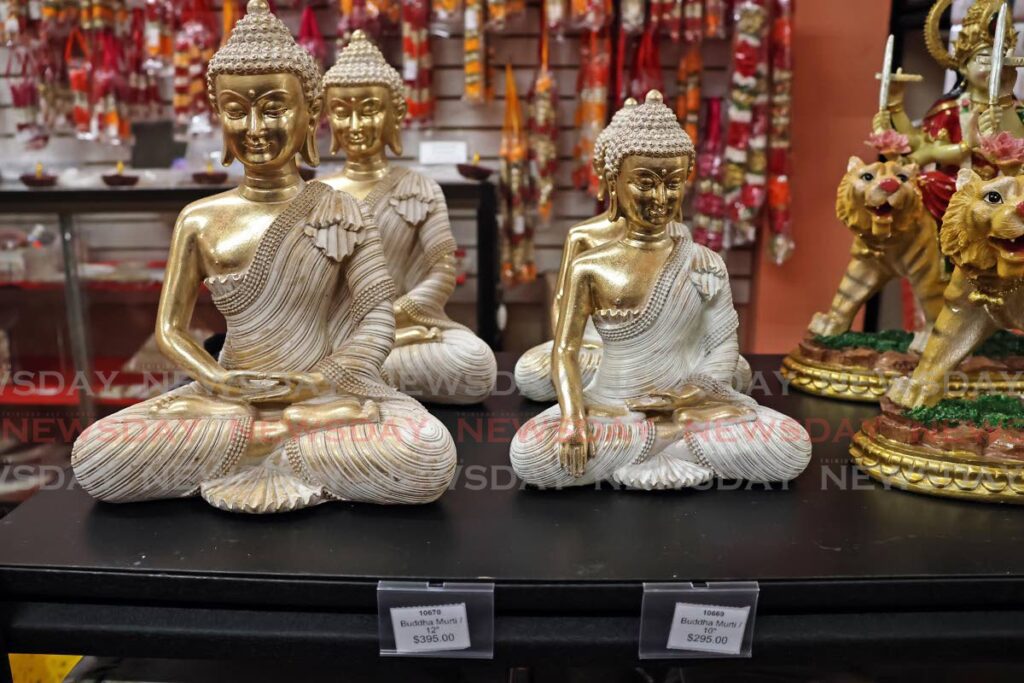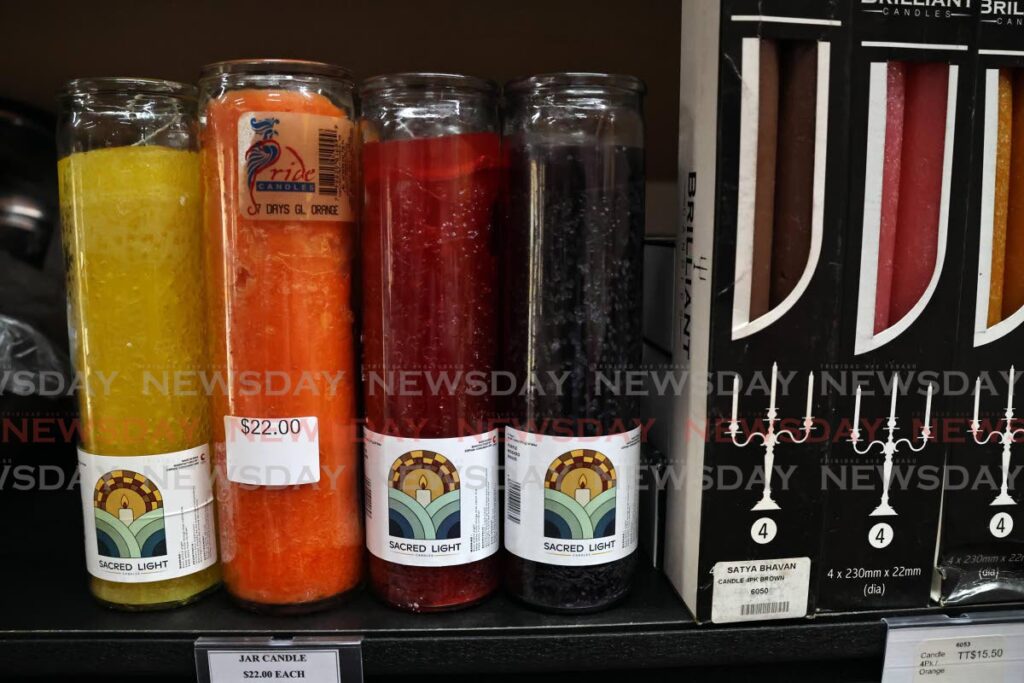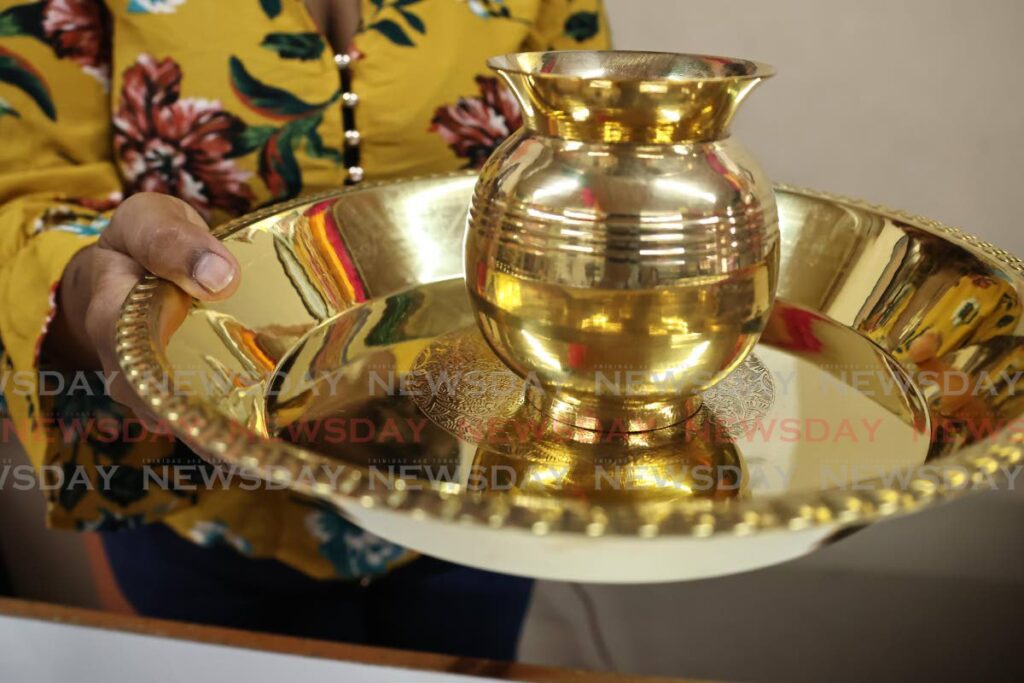Family legacies at the heart of puja stores

BAVINA SOOKDEO
THE puja store industry has blossomed into a niche yet essential business sector that caters to a range of religious and cultural needs.
Traditionally, puja stores served as modest family-run businesses focused on religious supplies for major Hindu festivals.
Today, the landscape has evolved, with many stores transformed into one-stop shops that offer not only ceremonial items but an assortment of other products, including groceries and beauty products.
As these businesses grow, they confront new challenges and have adopted innovative strategies to maximise their operations.
Business Day spoke to three puja stores in various areas for feedback on this industry.
Tradition and family legacy
Satya Bhavan Puja and Variety Store, at Ramsaran Street, Chaguanas, is a family legacy deeply rooted in the community.
A third-generation relative of its founders said it originally started with grandparents Parsuram Ramsundar and Sulin Ramsundar.
“After our grandparents, our mother took over and continued to run the business. Now the store has been passed down to us.”
The boutique-style store has built a reputation as a trusted space where customers can find specialised spiritual and religious items in a pure environment. Satya Bhavan places importance on upholding traditional values, ensuring each product is maintained in an uncontaminated setting.
D’s Puja and Variety Store, at the corner of Junon Street East and Southern Main Road, California, run by sisters Denise Chinpire-O’Reilly and Diane Chinpire, began more than 20 years ago as a small business to keep their mother active in her golden years.
As sales grew, so did the store’s vision, and it evolved into a fully registered business, Akshara Trading.
The sisters took it further by sourcing unique items from India, offering wholesale services and strengthening their online presence to meet the demands of an expanding customer base.
“At the time, there were no puja stores in our area, so we recognised a need to bring this service closer to our community, with its large Hindu population,” Chinpire-O’Reilly said.
Jankie’s Puja Shop, Southern Main Road in La Romaine, is a product of Dyanand Jankie’s retirement dream. With a background in the petrochemical industry, he had always planned to open a puja store after retiring. His unexpected retrenchment in January 2021 accelerated this vision. The shop has quickly become a staple in the community, offering religious items and supplies with a personal touch.
Adapting to industry shifts
Over the years, the puja store industry has evolved, and Satya Bhavan has grown with it.
As the relative pointed out, the industry has expanded from focusing mainly on festivals like Divali and Shivratri to accommodating a broader range of celebrations, such as Ganesh Utsav and Navratri.

This trend has led Satya Bhavan to increase its product offerings, adapting to demand not only for religious items but for those that fit into everyday life – health products, wedding supplies, and even educational texts.
Additionally, the rise of digital platforms has prompted the store to adopt new communication channels such as WhatsApp and other social media. This enables it to stay connected with customers and simplify the ordering process. Through online interactions, it aims to provide both product information and educational content on upcoming religious days. This strategy not only brings in new customers but helps deepen their relationship with the store.
D’s Puja and Variety Store, described by Chinpire-O’Reilly as “a boutique puja store where all items are hand-selected and special,” has also adapted to industry shifts.
“In the early days, customers came in with handwritten lists handed down from generation to generation, or from their pundits.
"Now, they send us lists via e-mail or WhatsApp messaging.”
She explained that pujas can now be done with artificial bamboo being planted and imported cow dung powder for
bedis (earthen prayer altars).
“Traditionally, preparing for religious ceremonies involved nights of sweet-making and preparing vegetables for the meals…now it’s a lot easier to purchase catered meals and
meethai (sweets).”
To keep up with industry shifts, D’s Puja Store has also implemented social-media marketing and community announcements, like using “the mike-drive through the community,” which has helped it stay relevant and connected.
“Additionally, we are on social media, as everyone is either on TikTok, Facebook or Instagram, old and young alike,” Chinpire-O’Reilly said.
Over its three and a half years, Jankie’s Puja Shop has evolved, embracing technology to streamline inventory and enhance customer service.
Initially managing stock manually through spreadsheets, Jankie upgraded to a point-of-sale system and expanded storage, making it easier to track inventory and cater to demand.
“We now track everything electronically,” he explained, a change that has been vital as his customer base and product range continue to grow.
One-stop-shop and diversification
Satya Bhavan has become a one-stop shop for cultural, spiritual and everyday needs.
“We’ve prioritised offering a wide range of items that go beyond traditional religious supplies,” said the relative. “We aim to provide everything our customers may need, whether for religious purposes, weddings, funerals, ancestral rites or daily life. The store now carries a diverse range of items – from groceries and health and beauty products to clothing, cultural and spiritual items, houseware and decorations.”
This variety also caters to “families with blended religions,” the interviewee noted. This expanded inventory helps Satya Bhavan maintain steady business beyond peak periods, which include Divali, Navratri, and Ganesh Utsav.
D’s Puja Store too caters to a diverse clientele.
“While we focus on religious goods year-round, we also see seasonal peaks for non-religious items,” Chinpire-O’Reilly explained. “For Valentine’s Day, we have roses and chocolates, and for Christmas, we stock toys and decorations.”
The store’s unique, hand-selected items position it as a boutique option, distinct from larger chains.
Meanwhile, Jankie’s Puja Shop is committed to providing a full range of puja-related items under one roof.
“We try to maintain a strict puja-shop business first,” Jankie said.
He said he also understands the value of offering convenience for his customers, so he provides everything necessary for puja in one place, ensuring a stress-free shopping experience, especially for those who have specific religious needs.

Beyond traditional items, he also offers accessories like cleaning products for brass and metal utensils, adding value without straying from its religious focus.
Strategic response to peak periods
How does Satya Bhavan handle peak periods?
“Our starting point is always the religious calendar, and we examine the auspicious day of every month,” explained the relative. “Via our social media platforms, we dedicate a great deal of effort towards educating our audience on upcoming days and how celebration and worship should take place.”
The store’s operations shift to accommodate increased demand. It hires temporary staff as needed and ensures inventory management is optimised to meet the uptick in customer traffic. However, its approach to marketing remains understated. Rather than aggressive promotions, it focuses on enhancing customer experience, fostering a sense of loyalty that brings customers back.
“Our marketing strategy is to always delight our customers,” said the relative.
D’s Puja Store also meets high demand during festivals by meticulously planning its operations around the Hindu calendar.
“For locally sourced goods, orders are placed months in advance. Deyas for Divali are ordered the day after Divali for the following year,” Chinpire-O’Reilly said. “A lot of our goods are imported directly from India, based on sales trends we have identified. We ensure all items are in stock for all major celebrations, and for any shortfalls, we buy locally. Staffing is increased just for these busy seasons.”
Jankie’s Puja Shop increases its advertising efforts and engages with the community digitally.
“We push out advertisements via Facebook and other platforms and create short-form videos to guide customers,” Jankie said.
These videos are particularly popular during Ganesh Utsav, when step-by-step instructions for performing rituals at home are shared. Inventory planning also plays a crucial role, with items like wax deyas stocked well in advance to avoid shortages.
Consumer trends and challenges
As holistic wellness awareness grows, Satya Bhavan has seen a rise in demand for spiritual items, including oils, sage and cleansing products for body and home.
“These items allow us to serve the community more comprehensively,” said the relative. “Many customers seek products supporting physical, mental, and spiritual wellness, like crystals, protective jewellery and home items.”
The store has adapted to these needs, adding oils, candles, literature and brassware to meet diverse interests. In this way, it has not only strengthened its financial stability but reinforced its role as a hub for community and spirituality.
But challenges abound. The rise of religious aisles in grocery stores has introduced increased competition, forcing specialised stores like Satya Bhavan to differentiate through their purity-focused environment and personalised customer interaction.
Rising supply costs, economic volatility and crime also present hurdles.
“We’ve had to adjust pricing to reflect these changes while trying to remain affordable for our customers,” the relative said.
The upside is, as Chinpire O’Reilly said, “Customers prefer to support the businesses where they can get reliable service, friendly faces and quality products and services. Every year customers change their preferences – one year we will see a trend towards wax deyas, and another, huge murtis will sell for Ganesh Utsav. The customer just wants what they want, and we have to be able to provide to their preference in that year.”
As for the challenges D’s Puja Store faces, these include rising costs, crime, staying relevant and foreign-exchange limitations.
“Cost of labour, fuel, utilities and various bank charges affect our ability to manage our pricing model, and sometimes we have to price lower for the benefit of our customers," said Chinpire O’Reilly.
More customers also now seek convenience. Jankie’s Puja Shop has adapted by offering services like delivery and extended hours.
“After-hour services are a privilege we offer to working customers,” Jankie noted, addressing the needs of clients whose schedules clash with standard hours.
Trends like pre-cut bamboo also reflect a demand for items that simplify traditional practices.
Despite rising costs and economic uncertainties, Jankie’s Puja Shop has kept prices stable by sourcing supplies from multiple local wholesalers, ensuring availability without passing on significant costs to customers.
The future of puja stores
The puja store industry in TT is positioned for growth, with many store owners believing their role in preserving cultural traditions will only deepen.
Satya Bhavan hopes to expand its offerings and potentially introduce delivery services to broaden its reach. The store is committed to supporting families. Its managers see this as “a responsibility to maintain the traditional items, but also adapt to accommodate the younger generation.”
D's Puja and Variety Store too has blended tradition with a modern touch. There are plans to expand to another branch and to offer a wider range of items to customers.
Chinpire O’Reilly believes puja stores will always be a necessity to the country.
She insists, “It is important for puja stores to remain relevant to the ever-changing dynamics of the customer and continue to support our religious traditions such as Ramleela, Ganesh Utsav and Raksha Bandhan and not allow our heritage to be lost, especially now, when a lot of young children are being encouraged to participate in religious functions.”
Jankie also envisions a growing role for puja shops as essential providers of religious and cultural items.
“I see many more puja shops opening in rural areas to meet devotees’ needs,” he said, recognising the increasing demand for accessible and affordable religious supplies. His commitment to keeping puja items affordable stems from a desire to preserve cultural practices. As Jankie’s Puja Shop moves forward, it will continue to embrace technology, expand its services, and serve as a pillar of support for the local Hindu community, bringing tradition and modern convenience together under one roof.

Comments
"Family legacies at the heart of puja stores"